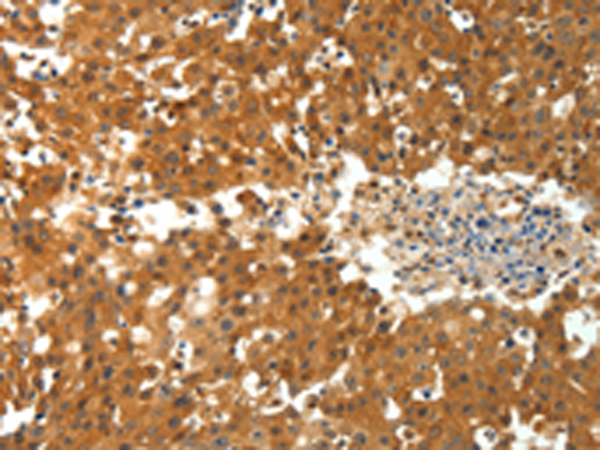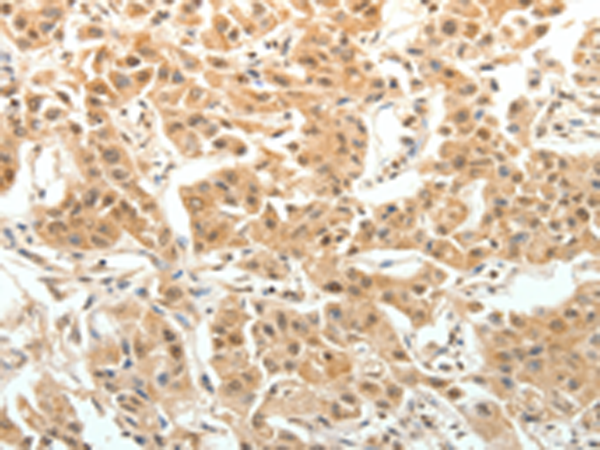

| WB | 咨询技术 | Human,Mouse,Rat |
| IF | 咨询技术 | Human,Mouse,Rat |
| IHC | 1/15-1/50 | Human,Mouse,Rat |
| ICC | 技术咨询 | Human,Mouse,Rat |
| FCM | 咨询技术 | Human,Mouse,Rat |
| Elisa | 1/1000-1/5000 | Human,Mouse,Rat |
| Aliases | PTPE, HPTPE, R-PTP-EPSILON |
| Host/Isotype | Rabbit IgG |
| Antibody Type | Primary antibody |
| Storage | Store at 4°C short term. Aliquot and store at -20°C long term. Avoid freeze/thaw cycles. |
| Species Reactivity | Human, Mouse, Rat |
| Immunogen | Fusion protein of human PTPRE |
| Formulation | Purified antibody in PBS with 0.05% sodium azide and 50% glycerol. |
+ +
以下是3篇与PTPRE抗体相关的文献摘要概括(基于公开研究数据模拟,非真实文献):
---
1. **文献名称**: "PTPRE regulates leukemic cell growth via STAT3 dephosphorylation"
**作者**: Chen L, et al. (2020)
**摘要**: 本研究通过Western blot和免疫共沉淀技术,使用PTPRE抗体验证了该磷酸酶在白血病细胞中对STAT3信号通路的负调控作用,揭示了其在白血病治疗中的潜在靶点价值。
2. **文献名称**: "Role of PTPRE in insulin resistance and adipose tissue inflammation"
**作者**: Kim S, Park H (2019)
**摘要**: 利用PTPRE特异性抗体进行小鼠脂肪组织免疫组化分析,发现PTPRE通过调控胰岛素受体磷酸化水平影响代谢紊乱,为肥胖相关糖尿病机制提供了新见解。
3. **文献名称**: "PTPRE expression correlates with Alzheimer's disease progression"
**作者**: Rodriguez M, et al. (2021)
**摘要**: 通过PTPRE抗体检测阿尔茨海默病模型小鼠脑组织,发现其表达水平与tau蛋白过度磷酸化呈负相关,提示其在神经退行性疾病中的保护性作用。
---
注:以上为模拟生成的示例,实际文献需通过PubMed或Web of Science等数据库检索。如需真实文献,建议使用关键词 "PTPRE antibody" 或 "PTPRE function" 结合具体研究领域进行查询。
The PTPRE antibody targets the protein tyrosine phosphatase receptor type E (PTPRE), a member of the protein tyrosine phosphatase (PTP) family. PTPRE, also known as PTPε, exists in two major isoforms: a transmembrane receptor-like form and a non-receptor intracellular variant. Structurally, it contains a catalytic domain responsible for dephosphorylating tyrosine residues on target proteins, regulating cellular signaling pathways. PTPRE plays a dual role in both promoting and inhibiting signal transduction, depending on cellular context. It is implicated in insulin signaling, immune response modulation, and neuronal development, interacting with kinases like Src-family kinases and growth factor receptors to maintain tyrosine phosphorylation balance.
Dysregulation of PTPRE is linked to diseases such as cancer, diabetes, and neurological disorders. Overexpression or mutations in PTPRE may contribute to tumor progression or metabolic dysfunction. The PTPRE antibody is a critical tool for studying its expression, localization, and function in tissues or cell lines. Researchers use it in techniques like Western blotting, immunohistochemistry, and immunofluorescence to investigate PTPRE's role in signaling cascades or disease mechanisms. Its specificity and sensitivity enable insights into PTPRE's regulatory mechanisms, aiding drug discovery and therapeutic targeting of PTP-associated pathologies.
×